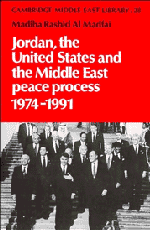Book contents
- Frontmatter
- Contents
- Foreword by William B. Quandt
- Acknowledgements
- Prologue
- 1 Introduction
- 2 Kissinger's legacy and imprint on the Middle East
- Part I Jordan in the Carter Middle East policy
- Part II Jordan in the Reagan Middle East policy
- Part III US, Jordan and Arab approaches to peace
- 10 The Arab framework for peace
- 11 Jordan embarks on several lines of foreign policy
- 12 US and Jordan: more wheeling and dealing
- 13 Postscript: evaluation and conclusion
- Appendices
- Notes
- Select bibliography
- Index
- Cambridge Middle East Library
11 - Jordan embarks on several lines of foreign policy
Published online by Cambridge University Press: 25 February 2010
- Frontmatter
- Contents
- Foreword by William B. Quandt
- Acknowledgements
- Prologue
- 1 Introduction
- 2 Kissinger's legacy and imprint on the Middle East
- Part I Jordan in the Carter Middle East policy
- Part II Jordan in the Reagan Middle East policy
- Part III US, Jordan and Arab approaches to peace
- 10 The Arab framework for peace
- 11 Jordan embarks on several lines of foreign policy
- 12 US and Jordan: more wheeling and dealing
- 13 Postscript: evaluation and conclusion
- Appendices
- Notes
- Select bibliography
- Index
- Cambridge Middle East Library
Summary
The planned year of action
According to conventional Arab wisdom, 1985 was to be the year of action in the American political cycle. Having assumed that the US could take no foreign-policy initiatives before its presidential elections were over, moderate Arab leaders had high hopes of the re-elected President Reagan acting decisively on the question of a comprehensive Middle East settlement.
The same conventional wisdom held that it was in the US national interest to bring Israel to accept a settlement of the Palestinian question based on the restitution of minimum, but essential, Arab rights, as advocated by America's Arab friends in the Middle East. In so doing, the US would not only refute the accusations of the radicals that the long-standing hopes vested in the Arabs' friendship with the US were only a mirage, but would also serve its own long-term interests by preventing the disintegration of the moderate Arab middle ground in the region. With Israel's growing economic dependence on the US, it was thought that the President, free from re-election pressures and, by extension, from the pressures of the Israeli lobby in Washington, could be persuaded to exert powerful leverage on Israel for the concessions necessary to establish peace. Even better, from the Arab point of view, was the landslide success President Reagan achieved without the help of the Jewish vote. He thus owed the Jewish lobby nothing in return.
These same Arab leaders were desperate to avoid stagnation setting in in the Middle East peace process.
- Type
- Chapter
- Information
- Publisher: Cambridge University PressPrint publication year: 1993

